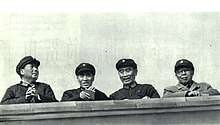Chen Boda
| Chen Boda | |
|---|---|
| 陈伯达 | |
| member of the Politburo Standing Committee of the Communist Party of China | |
|
In office 1966–1970 | |
| Personal details | |
| Born |
Chen Shangyu 29 July 1904 Hui'an, Fujian |
| Died |
20 September 1989 (aged 85) Beijing |
| Political party | Communist Party of China |
| Alma mater | Sun Yat-sen University |
| Chen Boda | |||||||||||||
| Traditional Chinese | 陳伯達 | ||||||||||||
|---|---|---|---|---|---|---|---|---|---|---|---|---|---|
| Simplified Chinese | 陈伯达 | ||||||||||||
| |||||||||||||
Chen Boda (Chinese: 陈伯达; Wade–Giles: Ch'en Po-ta; 1904–1989), was a secretary to Mao Zedong and a prominent member of the radical leadership during the Cultural Revolution, chairing the Cultural Revolution Group.
Early life
Chen Boda was born Chen Jianxiang (simplified Chinese: 陈建相; traditional Chinese: 陳建相; pinyin: Chén Jiànxiāng; Pe̍h-ōe-jī: Tân kiàn siong) in 1904 to peasant parents. His courtesy name was Shangyou (pinyin: Shàngyǒu; Wade–Giles: 尚友). During his childhood, his family moved to Jimei, in modern-day Xiamen, likely to facilitate young Chen's enrollment at the Jimei Normal School. In 1925, Chen enrolled at Shanghai Labor University, and in 1927 he joined the Communist Party of China. After returning to Fujian, he was hired as the personal secretary of General Zhang Zhen, helping to prepare for the 1926–1927 Northern Expedition from the CCP side of the First United Front. When the Front collapsed, Chen fled and was eventually arrested in Nanjing. He was released after a month on General Zhang's recommendation. Shortly thereafter, Chen was selected to study at Sun Yat-sen University in Moscow for four years.[1]
In 1931, Chen Boda returned to China, and married Sichuan native Zhu Yuren, who had also studied in Moscow. Chen began teaching ancient Chinese history in Beijing while writing articles under the pen names Chen Zhimei and Chen Boda. Most of these articles focused on the dispute between advocates of "national defense literature" such as Lu Xun, and more nationalist authors. Chen also did underground work for the Party in Tianjin. From 1937 on, he lectured at the Central Party School in Yan'an, where he became a leader in the Yan'an Rectification Movement. He soon became personal research assistant and secretary to Mao Zedong. Chen published the first collection of Mao's writings in 1937, and an official history of the Party in 1945.[1]
Role in the post-1949 government
In 1951, he wrote an article with the title Mao Zedong's theory of the Chinese Revolution is the combination of Marxism-Leninism with the Chinese Revolution and a book entitled Mao Zedong on the Chinese Revolution. These works made him one of the most important interpreters of Mao Zedong Thought, and in the 1950s he became Mao's personal secretary and close associate, and compiled many of the quotations published in Quotations from Chairman Mao Tse-tung.[2] In 1958, he became the editor of the party journal Red Flag.
Cultural Revolution

From 1966 until 1969, Chen Boda was to play an important role in the Cultural Revolution. In May 1966, he was placed at the head of the newly formed Cultural Revolution Group (CRG), a body established to oversee and direct the course of the Cultural Revolution.[3] In time, this group would rise to become the most important political body in China, surpassing even the influence of the Politburo.[4] Furthermore, Chen Boda was also placed as head of the Communist government's propaganda apparatus alongside Jiang Qing when the previous leader, Lu Dingyi, was deposed in 1966.[5] He also became a member of the Standing Committee of the Politburo.[6]
The Cultural Revolution Group began to show signs of ultra-leftism according to the Central Committee leadership, and Boda's reputation began to wane after the 9th Party Congress in 1969.[7] This marked the end of Chen Boda's involvement in the Cultural Revolution. As the leadership became more moderate in its outlook and the initial aims of the Cultural Revolution were sidelined, Chen's radicalism caused concern, and he was denounced at the 10th Party Congress in 1973 as a 'revisionist secret agent' for his associations with Lin Biao.[8]
Later life
After the Cultural Revolution, he was tried by the post-Mao government for collaboration with the Gang of Four.[9] He was sentenced to eighteen years in prison, but was released shortly afterwards due to his ill health. He died on 20 September 1989.
References
- 1 2 Leung, Pak-Wah (2002). Pak-Wah Leung, ed. Political Leaders of Modern China: A Biographical Dictionary (Illustrated ed.). Greenwood Publishing Group. pp. 10–12. ISBN 978-0-313-30216-9.
- ↑ Meisner, M; 'Mao's China and After: A History of the People's Republic since 1949'; Free Press (2006); p. 151
- ↑ Guillermaz, J; 'The Chinese Communist Party in Power, 1949-1976'; Westview Press (1976); p. 401
- ↑ MacFarquhar, R and Schoenhals, M; 'Mao's Last Revolution'; Belknap Harvard (2006); p. 155
- ↑ Meisner, M; 'Mao's China and After: A History of the People's Republic since 1949'; Free Press (2006); p. 332
- ↑ Meisner, M; 'Mao's China and After: A History of the People's Republic since 1949'; Free Press (2006); p. 403
- ↑ MacFarquhar, R and Schoenhals, M; 'Mao's Last Revolution'; Belknap Harvard (2006); p. 156
- ↑ Guillermaz, J; 'The Chinese Communist Party in Power, 1949-1976'; Westview Press (1976); p. 461
- ↑ Meisner, M; Mao's China and After: A History of the People's Republic since 1949; Free Press (2006); p. 461